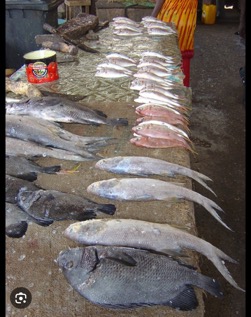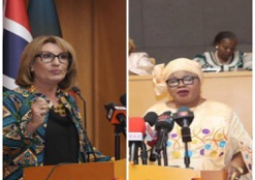
During a recent interview with The Point at the Latrikunda Market, these women expressed their frustrations and urged the government to address the issue and find solutions to make fish more affordable.
Isatou Badjie, a resident of Bundung, shared her concerns at the Latrikunda Market, where she lamented the difficulty of purchasing quality fish. “Every woman wants to buy good produce and fish to prepare for her family, but with prices skyrocketing, it’s becoming impossible,” she said. Badjie noted that a decent portion of fish now costs upwards of 400 dalasis. “If you only have 500 dalasis for fish, how can you afford to provide for your family?” she questioned. She urged the government to take immediate action to control prices as the situation continues to worsen.
Ya Ellen Manga, a fish vendor with five years of experience, shared her challenges over rising fish prices. According to her, in the past, a basket of fish could be bought at much lower prices, but things have changed drastically. “Now, it costs over 8,000 dalasis or more to buy a single basket of fish,” she said.
When she tries to sell the fish, customers often complain about the price and would rather go to a different seller. “It’s difficult for us because sometimes we don’t make enough sales,” Manga added, noting that unsold fish often have to be kept on ice, and if it doesn’t sell quickly, it risks spoiling, resulting in financial losses. She urged the government to find an immediate solution to this issue.
Fatou Sarr, a resident of Latrikunda Sabiji, expressed surprise about the steep rise in fish prices across the country. She explained that while managing with limited resources may be feasible for smaller households, it becomes a significant challenge for those with extended families.
Describing her experience, Sarr shared that she often feels overwhelmed when visiting the market. “Sometimes, after buying fish, I’m left with barely anything for other essentials like vegetables and cooking oil,” she revealed. “I try to add up all my expenses, and while I know I haven’t been overcharged, it’s disheartening. The wealthy may not feel the impact, but what we go through daily is something only God truly understands.”
She urged the government to intervene and take measures to help alleviate the burden on families like hers.
Amie Touray, a fish buyer from Fajikunda, shared her concerns about the current fish market. She observed that the only affordable fish available is imported, but she often avoids it due to its lack of flavour. According to Touray, the high cost of local fish stems from the dominance of Senegalese vendors at the markets. “When you go to the beach, you mostly see Senegalese youth working and earning, while Gambian youth are rarely present,” she noted. Touray believes the vendors prioritise profits, often overlooking the financial constraints of customers. She urged Gambian youth to take an interest in these jobs, emphasising that not everyone is suited for office work.
Jatou Jobe, a fish vendor, appealed to the Ministry of Fisheries for support in establishing a cold room in the local market. She expressed frustration over slow business and the high cost of purchasing ice blocks daily, especially given the limited sales.





